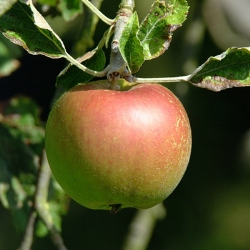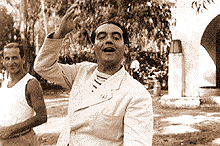|
Federico García Lorca
Ballad of the Moon, Moon
Dedicated to Conchita García Lorca
The moon visited the smithy,
perfumed, in her bustled skirt.
The boy stares, stares at her.
The boy is staring hard at her.
In the restless wind
the moon sways her arms,
revealing, wanton and pure,
her breasts of hard tin.
- Run away, moon, moon, moon.
If the gypsies come,
they’ll make necklaces and amulets
out of your heart.
- Child, let me dance.
When the gypsies come,
they’ll find you lying on the anvil
with your little eyes shut.
- Run away, moon, moon, moon.
I can already hear their horses coming.
- Child, let me be;
don’t step on my starched white hem.
The horseman was drawing near,
beating the drum of the plain.
In the smithy,
the boy’s eyes are closed.
Through the olive grove the gypsies were riding,
all bronze and dream,
heads held high,
eyes half shut.
How the nightjar sings!
Oh, how she sings in the tree!
Across the sky goes the moon,
leading a child by the hand.
In the smithy, the gypsies
weep and cry out.
The wind watches, watches over it.
The wind is keeping watch over it.
The Sleepwalker Ballad
Dedicated to Gloria Giner and Fernando de los Ríos
Green how I love you green.
Green wind. Green branches.
The ship on the sea
and the horse on the mountain.
With her belt in the shadows,
she dreams on her balcony,
green flesh, green hair,
with eyes of cold silver.
Under the gypsy moon,
all things are watching her
and she cannot see them.
Green how I love you green.
Immense stars of frost
arrive with the dark fish
that clears the path to dawn.
The fig tree rubs the wind
with its sandpaper branches,
and the hill, a feral cat,
raises its rough hackles.
But who is coming, and by what road? . . .
She is still on her balcony,
green flesh, green hair,
dreaming of the bitter sea.
- Friend, I want to trade
my horse for your house,
my saddle for your mirror,
my knife for your blanket.
Friend, I’ve come bleeding
all the way from the Cabra Pass.
- If I could, lad,
I’d make this deal with you.
But I’m not myself anymore,
and my house is no longer mine.
- Friend, I want to die
properly in my bed.
A steel bed, if I can,
on sheets of Holland linen.
Can’t you see this wound
that runs from my chest to my throat?
- Your white shirt is covered
with three hundred dark roses.
Your blood smells and it’s oozing
from your bandage.
But I’m not myself anymore,
and my house is no longer mine.
- At least let me climb up
to the high balconies.
Let me! Let me go up
to the green balconies.
The moonlit railings
where the water roars.
Now the two men climb
up to the high balconies.
Leaving a trail of blood.
Leaving a trail of tears.
Little tin lanterns
were flickering on the rooftops.
A thousand glass tambourines
were wounding the dawn.
Green how I love you green,
green wind, green branches.
The two men climbed up.
The heavy wind left
in the mouth a strange taste
of bile, mint and basil.
- Friend! Tell me, where is she?
Where’s your bitter girl?
- How many times she waited for you!
How many times she’d wait for you,
her face fresh, her hair black,
on this green balcony!
Over the surface of the cistern
the gypsy-girl was swaying.
Green flesh, green hair,
with eyes of cold silver.
An icicle of moonlight
holds her above the water.
The night closed in
like a little town square.
Drunken Civil Guards
were pounding on the door.
Green how I love you green.
Green wind. Green branches.
The ship on the sea.
And the horse on the mountain.
Ballad of the Black Yearning
Dedicated to José Navarro Pardo
As roosters’ pickaxes
dig in search of the dawn,
down from the dark hills
comes Soledad Montoya.
Her flesh of yellow copper
smells of horse and shadow.
Her smoke-colored breasts
moan clear ballads.
- Soledad, who are you looking for,
alone, at this time of day?
- It doesn’t matter who I’m looking for;
tell me, what’s it to you?
I want what I want,
my joy and my body.
- Soledad, my sorrowful one,
the runaway horse
always gets as far as the sea,
only to be swallowed by the waves.
- Don’t remind me of the sea,
because the black yearning flows
in the land of the olive tree
under the whisper of its leaves.
- Soledad, how you suffer!
Such terrible torment!
You are weeping lemon juice
that flows bitter with longing.
- Such great yearning!
I run around the house like a madwoman,
from my kitchen to my bedroom,
my two braids trailing on the floor.
Such yearning! My skin and clothes
are turning black.
Oh, my linen nightgowns!
Oh, my poppy thighs!
- Soledad, wash your body
with the skylark’s water,
and leave your heart
alone, Soledad Montoya.
Downhill the river sings:
a ruffle of sky and leaves.
The new light is covered
with pumpkin flowers.
Oh, the yearning of the gypsies!
Always such pure, black yearning.
Oh, hidden river of yearning
and faraway dawn!
-- Translated from the Spanish by Catherine Chandler
© Catherine Chandler
|

